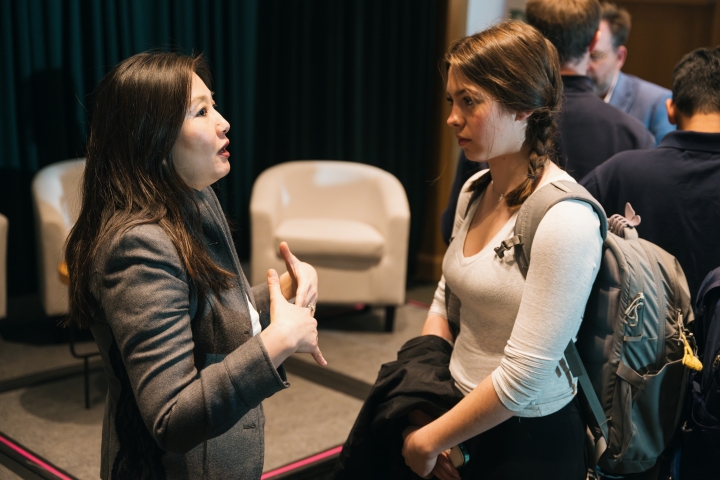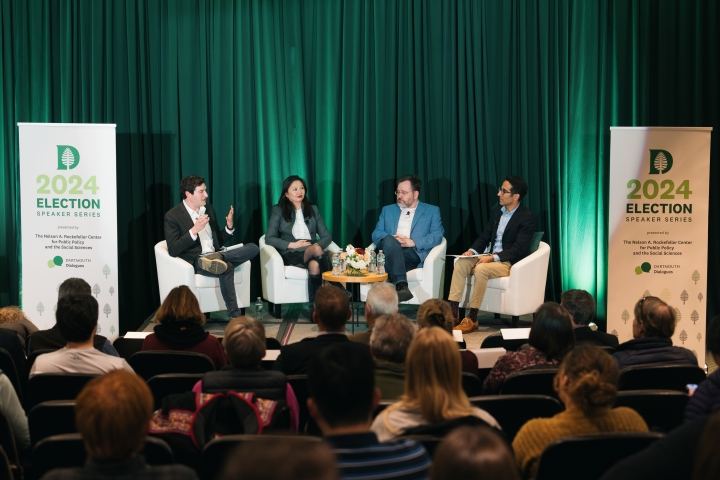The role of the Supreme Court in American life, from ruling on presidential immunity to limiting how colleges and universities may consider race in their admissions policies, was the subject of a panel discussion Tuesday that featured legal scholars Jeannie Suk Gersen and Keith Whittington.
Will the court, which has traditionally considered its judicial reasoning as separate from partisan politics, increase or constrain the power of the incoming administration? If President-elect Donald Trump will benefit from presidential immunity, for instance, that concept also extends to the former living presidents, Gersen, the John H. Watson, Jr. Professor of Law at Harvard Law School and author of At Home in the Law, told an audience of 175 at Filene Auditorium, with another 125 watching online.
“A lot of these are double-edged decisions, and when we see them only with the assumption that the party in power in the executive branch is our party, it looks utterly different than when you think of them as cases that constrain executive branch power,” Gersen said.
Gersen, who also writes for The New Yorker, made her comments as part of a 2024 Election Speaker Series panel co-sponsored by the Nelson A. Rockefeller Center for Public Policy and Dartmouth Dialogues.
Whittington, the David Boies Professor of Law at Yale Law School and author of You Can’t Teach That! The Battle Over University Classrooms, was also a guest speaker.
The discussion was moderated by Herschel Nachlis, associate director and senior policy fellow at the Rockefeller Center and research assistant professor of government; and Sonu Bedi, the Joel Parker 1811 Professor in Law and Political Science.
The Supreme Court this year overturned the 40-year-old so-called “Chevron doctrine,” which had said that courts can defer to government agencies to interpret, within reason, ambiguous laws. But the decision may not fall the way court watchers and the press think it will, Whittington noted.
“In effect, it creates somewhat greater judicial checks on the administrative state and what it does. And that’s going to have applications for the Trump administration and make it harder for them to pursue some of the policy agenda they might otherwise pursue,” he said.
The panelists also weighed in on how colleges and universities have recalibrated practices, given the Supreme Court’s overturning of affirmative action in weighing the role of race in student admissions; whether there should be term limits for Supreme Court justices; concerns about potentially unethical conduct by justices in not reporting gifts; and distinguishing between what we know about a justice’s personality and their legal temperament.
Yes, the “individual character of the person exercising power makes a difference. But it’s extremely hard to measure that very effectively and analyze it in very meaningful ways,” Whittington said. More to the point is discerning the “subtle differences in judicial philosophy” between, say, Justices Samuel Alito, Amy Coney Barrett, and Chief Justice John Roberts, Whittington added.

The panelists and audience returned consistently to the question of how colleges and universities handle questions of free speech and academic freedom, and what constitutes harassment in light of speech that may be perceived as uncomfortable.
“Political protest has got to be part of any university’s commitment to free speech and expression. It would be like if the university said no political protests are allowed at all. I certainly would consider that to be highly repressive and inconsistent with the idea of academic freedom and free speech,” Gersen said. At the same time, there is a tightrope balance between free speech on campus and such competing values as not being disrupted in a classroom or feeling safe in a public space, she said.
“Disruption is a concept that needs some defining. And so we have to do the hard work to figure out what it means to disrupt,” Gersen added.
Jacob Markman ’27, who wants to pursue a career in law, was struck by how the discussion affirmed his belief that the Supreme Court had more “long-term stability than the media makes it appear.” While there have been recent controversies, he said he did not think it was necessarily indicative of “broader corruption in the court.”
Dartmouth’s 2024 Election Speaker Series continues on Thursday, Nov. 14, with Henry Enten ’11, senior political data reporter and host of CNN’s Margins of Error; and Feb. 20 with attorney, educator, and women’s rights advocate Anita Hill.

